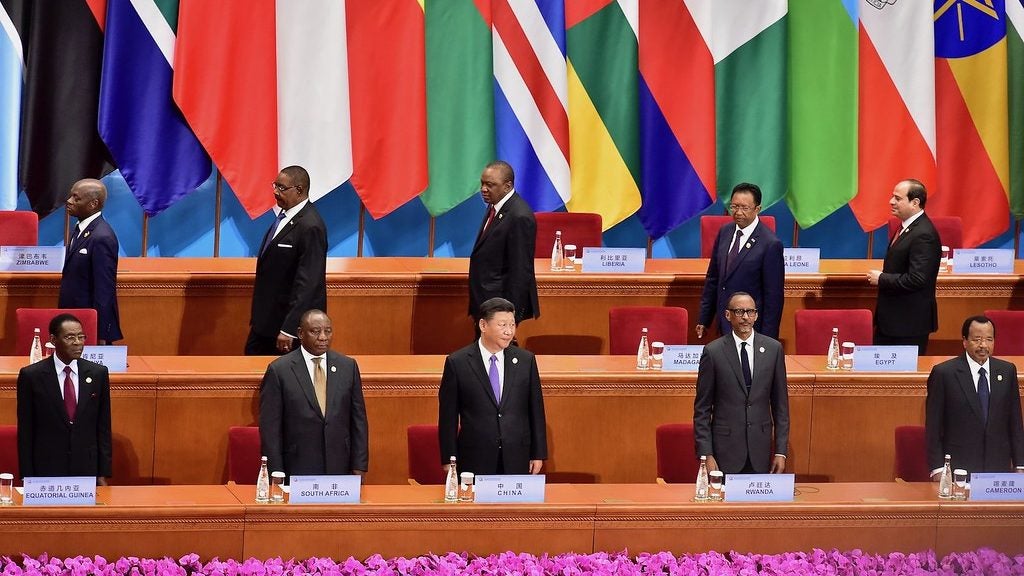The Henry Luce Foundation has awarded the African Studies Program (AfSP) and Asian Studies Program (ASP) in the Walsh School of Foreign Service (SFS) a grant to conduct joint work on Africa-China relations. Supporting a program titled the Georgetown Africa-China Initiative, the grant will fund events and a policy working group focused on how Africa and China engage each other in diplomacy, trade, development, migration and global health.
For AfSP professor Dr. Yoon Jung Park, the opportunity to direct the initiative is a timely one. A leader in the growing field of China-Africa studies, Park explains that scholars and practitioners will have the opportunity to counter simplistic and misconstrued narratives about the changing relationships between China and African countries.
“Given the ongoing circulation of misinformation (e.g. ‘debt trap diplomacy’) and heavily politicized narratives that demonize China and dismiss African agency, we feel it is imperative to educate our audiences with the complicated and nuanced realities of Africa-China engagements,” she says.

Policy Impact in Washington and Beyond
Made possible by the support of the Henry Luce Foundation, the Georgetown Africa-China Initiative has the overall aim of promoting multifaceted, evidence-based discussions of how China and African countries perceive and engage with each other, offering policy recommendations and corrections to oversimplified narratives.
“As new public opinion polling data demonstrate, many African citizens see China as having a positive influence on political and economic development in their countries, suggesting that scholars and teachers alike should be taking seriously what these influences and relationships are,” says AfSP Director Dr. Lahra Smith.
She continues, “By bringing in diverse experts on these topics and leveraging our deep regional expertise in African and Asian Studies at SFS, as well as Dr. Park’s years of study and networking on Africa-China connections, the initiative will substantively contribute to new approaches to these topics.”

Over the next year, Park will coordinate both an event series and a policy working group focused on Africa-China relations. AfSP and ASP will host lectures, webinars, book talks and film screenings to facilitate nuanced dialogue around the transregional relationship and share “new, evidence-based Africa-China research produced by experts for both Georgetown and DC area public audiences,” Park says.
On the working group side, the two SFS programs will convene experts to discuss and make recommendations on how to develop more robust knowledge of the evolving diplomatic, business and cultural relationship between China and African countries.
“The policy working group is meant to bring together experts to strategize on how we might have greater policy impact and to convene roundtables targeted at U.S. and other government agencies and legislators to educate them on these issues,” Park adds.
In particular, Park highlights “African debt [and] Chinese lending issues; China’s role in African infrastructure development; and impacts of Covid-19 on both economies, health and human relations” as especially consequential areas of research and discussion.
A Trans-Regional Approach
The events and working group dialogues funded by the Georgetown Africa-China Initiative will build on AfSP and ASP’s innovative approaches to building a scholarly community while studying an increasingly globalized world.
For Park, an AfSP adjunct professor, the grant represents an opportunity to present cutting-edge and forward-looking research that can respond to shifting international dynamics and examine historical nuances that may have been previously overlooked.
“While area studies are no doubt very important, the study of Africa-China engagement points to the importance of trans-regional studies,” she says. “We feel that this is much more reflective of both the history and current realities, and we are very excited about working closely with Asian Studies.”
Asian Studies Program Director Dr. Michael Green is looking forward to exploring the new academic avenues that the initiative will open up, both within the School of Foreign Service and in the wider field of international affairs.
“Asia scholars have long sought to understand the dynamics between China and other regional powers like Japan or India,” says Green. “But one cannot understand China’s impact any longer without taking a close look at the global south and particularly the complex dynamics of China’s relations with Africa.”
A collaborative ethos, Park says, is central to the goals of the initiative. She and her colleagues plan to involve SFS, Georgetown and DC-area community members in the event series and policy working group, bringing in experts with a wide range of Africa-China backgrounds and potential contributions.

“We hope to build on this small, one-year grant to seek further funding to expand the program to include more student-focused and research-focused work as well as possible research outputs,” Park adds.
As the Georgetown Africa-China Initiative seeks to convene a growing community of scholars interested in Africa-China issues, it is also focused on leveraging their expertise to develop a more rigorous understanding of how China and African countries interact. “Many of the popular narratives and framings around ‘China-Africa’ relations tend to really be about U.S. and European concerns about the growing influence of China in Africa,” Park explains.
With the initiative, she and her colleagues and contributors hope to offer a more balanced, evidence-driven approach to these relationships. “We would like to foreground African views, perspectives and experiences and challenge the notion of a single, coherent, consolidated ‘China’ in Africa.”